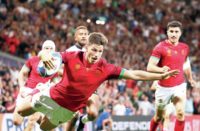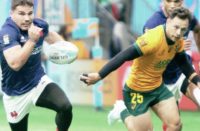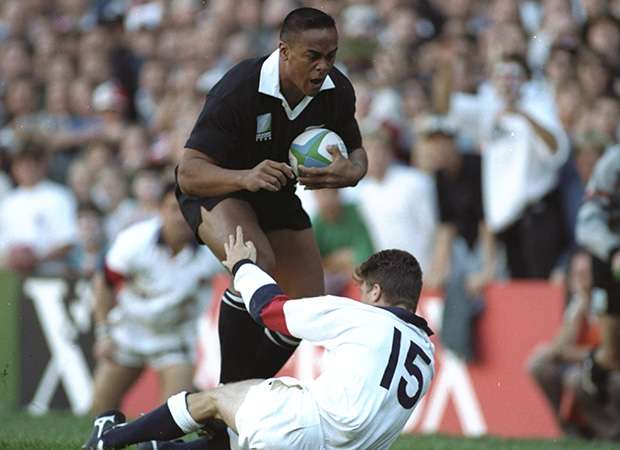 During a lifetime in sport journalism I can't remember anything more exhilarating and life enhancing than reporting on the young Jonah Lomu and then, for those brief but halcyon years, when he bestrode the rugby globe and scored one jaw-dropping try after another.
During a lifetime in sport journalism I can't remember anything more exhilarating and life enhancing than reporting on the young Jonah Lomu and then, for those brief but halcyon years, when he bestrode the rugby globe and scored one jaw-dropping try after another.
He was an athlete the like of which rugby had never seen before, yet away from that arena which he dominated so completely he was very human, vulnerable, modest and humble. Like no other sportsman I have ever encountered Lomu hit a button once he crossed the whitewash that transformed him totally.
It was Eric Rush who first alerted us to his genius. We were attending a plush pre-tournament cocktail party ahead of the 1994 Hong Kong Sevens on local businessman John Hung's luxury yacht when Rush warned us to look out for the 18-year-old schoolkid from Wesley that New Zealand were going to unleash on the unsuspecting world in a couple of days.
“He's bigger, stronger, faster and better than Inga (Tuigamala),” proclaimed Rush. Rather like our setting, cruising around Hong Kong Bay, his claim seemed a bit grandiose but Rush was not a man normally given to hyperbole.
Come the first match in the Hong Kong Stadium two days later and all was revealed as Lomu either sprinted around seemingly non-existent opponents or, when the mood took him, ran clean through them. Tacklers seemed to vaporise in his presence. The Hong Kong Standard devoted a full broadsheet front page picture of the charging teenager the following day which is still the scariest rugby image I've seen.
New Zealand naturally won the tournament – beating Australia 34-20 in the final – and within weeks Lomu had become the youngest All Black in history, number 941, playing two Tests against France. He roomed with John Kirwan whose mantle as New Zealand's greatest wing he was destined to take. It was a poorish New Zealand team, there was little chance to shine and Lomu was duly dropped although he played no better or worse than others. But the name had been noted. New Zealand don't give debuts to 18-year-olds unless they can play a bit.
For the rest of that year, and early in 1995, for the last time in his career, Lomu operated blissfully under the radar as he continued to learn his trade with Counties Manakau and was a fair way from the selectors minds for the 1995 World Cup.
He returned to the Sevens squad where Rush had always proved such a welcoming and encouraging father figure and again demonstrated, at his favourite Hong Kong tournament, that priceless ability to blow opponents away one-on-one as New Zealand stormed to another title. Meanwhile we non-Kiwis wondered how much longer New Zealand could continue without his services at 15s.
Not long was the answer. Under coach Laurie Mains, New Zealand had decided to opt for full-out attack at RWC1995 and the raw but potentially “match-winning” Lomu was back in contention although fate also played its part as Lomu explained to me on one occasion.
“I remember pitching up with New Zealand in 1995 as a fringe member of the squad. Somebody had pulled a hamstring at the World Cup camp and I was recalled from a Sevens tournament in Japan.
“Back in New Zealand I scored a few tries in a trial game and suddenly I was on the plane to South Africa. It was life-changing. I went from being a big kid who could walk around unrecognised to a month later when I would need a police escort to go out shopping.
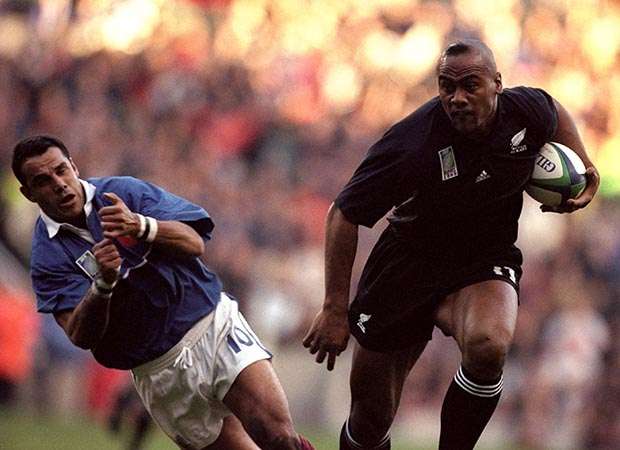 “My main memory of 1995 was just being so fit and healthy and being able to express myself on the pitch. The joy of playing. The final itself, well there was a bitter taste for about 30 seconds at the end at losing a close match but then I looked around at the crowd and listened to the roar when Francois received the trophy and it was obvious that something very big and good was happening to South Africa, the country, and it took all the disappointment out of the day. In all honesty I was glad to be there.”
“My main memory of 1995 was just being so fit and healthy and being able to express myself on the pitch. The joy of playing. The final itself, well there was a bitter taste for about 30 seconds at the end at losing a close match but then I looked around at the crowd and listened to the roar when Francois received the trophy and it was obvious that something very big and good was happening to South Africa, the country, and it took all the disappointment out of the day. In all honesty I was glad to be there.”
Lomu caused complete carnage on the pitch in South Africa. The sporting world at large still had to wait for his ‘unveiling' in that World Cup semi-final against England but the smaller world of rugby was agog from the moment he ripped Ireland to shreds in New Zealand's opener.
He repeated the dose against Wales and was also utterly magnificent against Scotland in the quarter-final. A Rugby god was moving among us. At one point he ‘bumped' the 17st Scotland captain Gavin Hastings, dismissing him from his presence as if he didn't exist. A rueful Hastings later famously said: “There's no doubt about it, he's a big bastard!”
Actually it wasn't Hastings first encounter with Lomu. That was in 1993 when the young Lomu – who had been playing for Counties Manakau Schools against their Northland counterparts in a curtain raiser – attended the 1993 Lions opener against North Auckland and he and his teammates mobbed Hastings for an autograph. There he is on DVD making faces, easily recognisable despite his long hair and at one point you can see Hastings look up quizzically at the man-boy goofing around. Who is this guy?
“That day still lives with me,” Lomu recalled. “The Lions were in town and the excitement was unbelievable. Our curtain-raiser was the first time I had played in front of a proper crowd and I felt very at home. That day I decided to take rugby seriously and vowed to play against the Lions although that never happened for me. We all crowded around Gavin when he came off. If you look at the film and Press pictures there I am acting the clown.”
Those first three weeks or so up in Pretoria at RWC1995 were priceless, still comparatively calm before the real storm broke. We Press types were staying in the same hotel as the All Blacks – such mingling was encouraged in those days – and every morning he would come down to breakfast with his headphones on, nod respectfully in our direction before helping himself to a mountain of food.
Then he would tuck himself away quietly in a corner, a shy, quite gauche, lad a million miles away from home and everything he knew. Until that is New Zealand manager Brian Lochore arrived. Lochore, one of the great rugby men, would soon gather everybody around for a prolonged post breakfast coffee and tell us about the old days and Lomu would take his headphones off and happily pull up a seat alongside us safe in the knowledge that for once there was no danger of being centre stage.
Down to Cape Town a week later Lomu's life changed for ever at Newlands as he put England to the sword with that remarkable quartet of tries. It was the moment rugby – and more pertinently Newscorp boss Rupert Murdoch – realised the game had a global superstar on which to found the nascent professional game. With his sculpted physique, Mohican haircut, and shaved eyebrows, there was an extra-terrestrial look to Lomu around this time. It added immeasurably to his X-factor and commercial appeal. He was from another world and everybody wanted in. As a player he was out-and-out box office but he demonstrated time and again he was so much more than just a power merchant.
The young Lomu had serious wheels, the kind of pace that can burn opponents – even Sevens speed merchants but he also possessed remarkable tiptoe balance. He could be both broadsword and scimitar. Often he would use his pace and outside break – perhaps aided by a fend straight from the boxing gym where he worked daily on the heavy bag – to make the initial inroad. Once beyond the gainline his brute strength and ability to walk through a tackle came into play.
“Nothing in rugby will compare with Jonah Lomu in 1995 and again in 1996 with New Zealand and the Auckland Blues,” recalls former captain Sean Fitzpatrick. “He scored some unbelievable tries for Auckland when we won the Super 12. He redefined what could be done, physically, on a rugby field. Rugby had seen very big, fit men but never anybody that big and that quick. Jonah could outsprint known speedsters on the outside and that, technically, made him just about impossible to tackle because once an opponent is reduced to trying to tackle him with one trailing arm all is lost.”
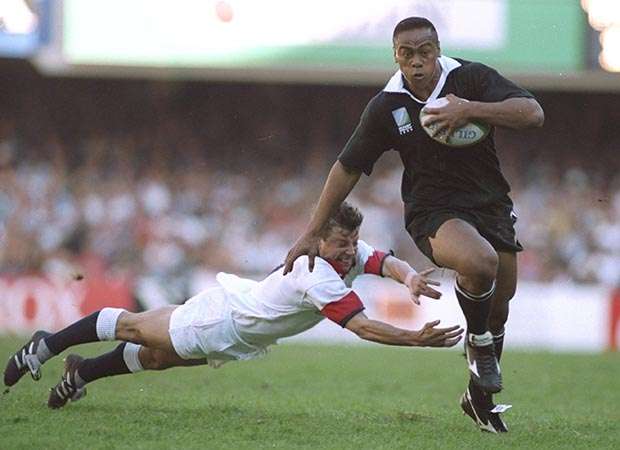 Yet even at this zenith, clouds were gathering. Even at 19 in South Africa he was experiencing occasional inexplicable pains and numbness in feet and hands and, by the end of the year, symptoms had worsened and nephrotic syndrome, a serious and often fatal kidney malfunction was diagnosed. Indeed Fitzpatrick believes at no stage during his senior career did Lomu function at more than 80 per cent of his athletic potential.
Yet even at this zenith, clouds were gathering. Even at 19 in South Africa he was experiencing occasional inexplicable pains and numbness in feet and hands and, by the end of the year, symptoms had worsened and nephrotic syndrome, a serious and often fatal kidney malfunction was diagnosed. Indeed Fitzpatrick believes at no stage during his senior career did Lomu function at more than 80 per cent of his athletic potential.
It was serious from the off even if ever-optimistic Lomu refused to consider it terminal. Initially the medics could exert a degree of control and, after taking the best part of 1997 out of the game, Lomu returned with his powers seemingly undiminished. In the 100 degree heat and humidity of Kuala Lumpur in 1998 I watched him make a stunning contribution to New Zealand's triumph in the inaugural Commonwealth Games Sevens while he was by a country mile New Zealand's stand out player at the 1999 Rugby World Cup.
There were good years and great tries thereafter but increasingly it was a struggle as illness and medication took their inevitable toll. He was still pretty much a regular for New Zealand until 2002 and again starred for the Sevens team which won the 2001 World Championship. He began to mature as a man and we learned more of his background, his proud Tongan heritage – he was fluent in the language – and his bizarre love for excessively loud music. He once held the decibels world record for his car's mobile sound system which had to be operated remotely some distance away.
But gradually the decline was there to see and by May 2003 he required dialysis three times a week. At times, when it was really bad, he scarcely had the energy to dress or make a cup of tea. In July 2004 a match was found and he underwent a kidney transplant with friend and Wellington DJ Grant Kereame acting as donor, and for while it seemed hopeful.
“Grant never wavered, despite being married with kids,” recalled Lomu another time I spoke with him. “The day before our double operations we went down the gym together to relax and were messing around trying some kick-boxing. Four or five times I said, ‘Grant, you don't have to do this man, it's not too late to stop'. Every time he just gave me a slap and told me to shut up. It was me getting cold feet.
“Nobody really deserves friends as strong as that. I was humbled by his love and support. I had to learn to walk and live again, I am as proud of that achievement as anything I did in the World Cup.”
There were comeback attempts with North Harbour, Cardiff Blues and even Marseille but it was asking too much of an ailing body. The spirit was always willing and the rugby world willed him on.
There has never been a more humble and popular gentle giant. This is a superstar who wouldn't hesitate to pick up your heavy bags and load them in the hotel taxi as you waited together in the queue. If there was a testimonial match that he could possibly play in he would be there.
But his body was weakening by the month and by 2011 he was back in serious medical difficulties as the body started to belatedly reject the new kidney.
Yet still the brave face and almost schoolboy bravura remained as he went into battle again with that mighty body that had slain so many opponents but was now turning on him. It was back to endless dialysis and tablets. He still kept going as an ambassador for the World Cup which built on the excellent work he, on behalf of the then IRB, performed as part of the team persuading the IOC that rugby should be readmitted to the Olympic Games.
Jonah was still the face of rugby to the bigger world and in 20, 50 or 100 years I suspect that will still be the case. Those of us privileged to witness the big man at his very best were truly blessed.



